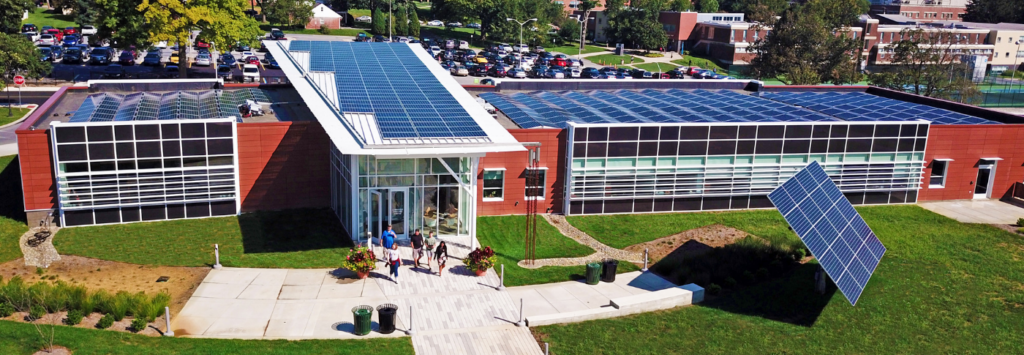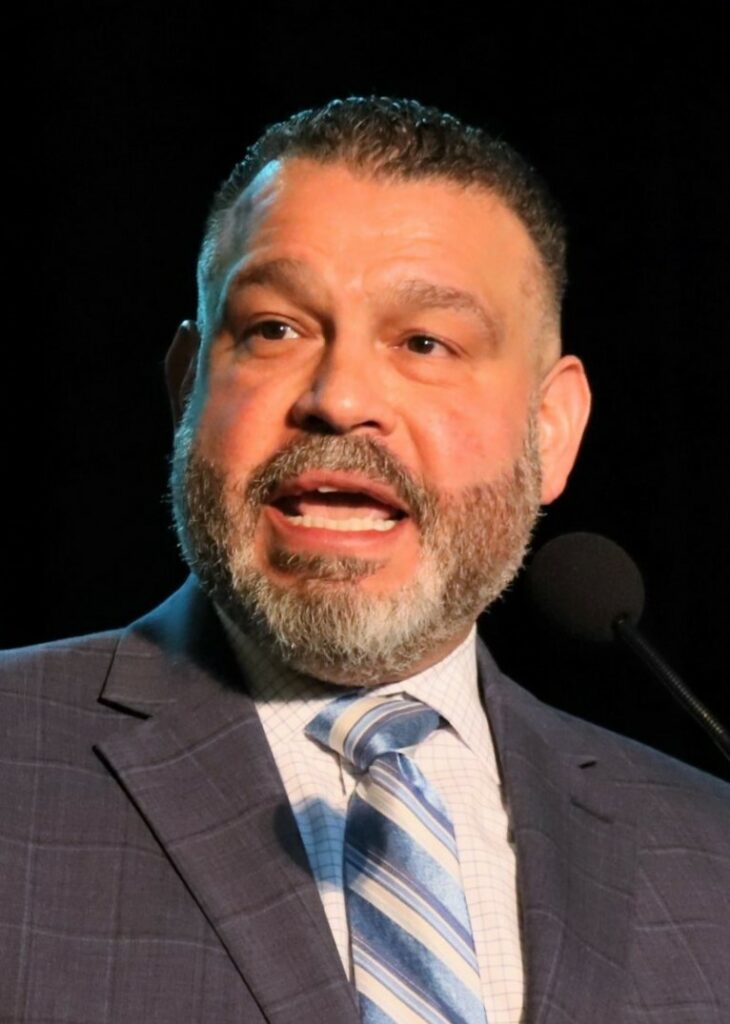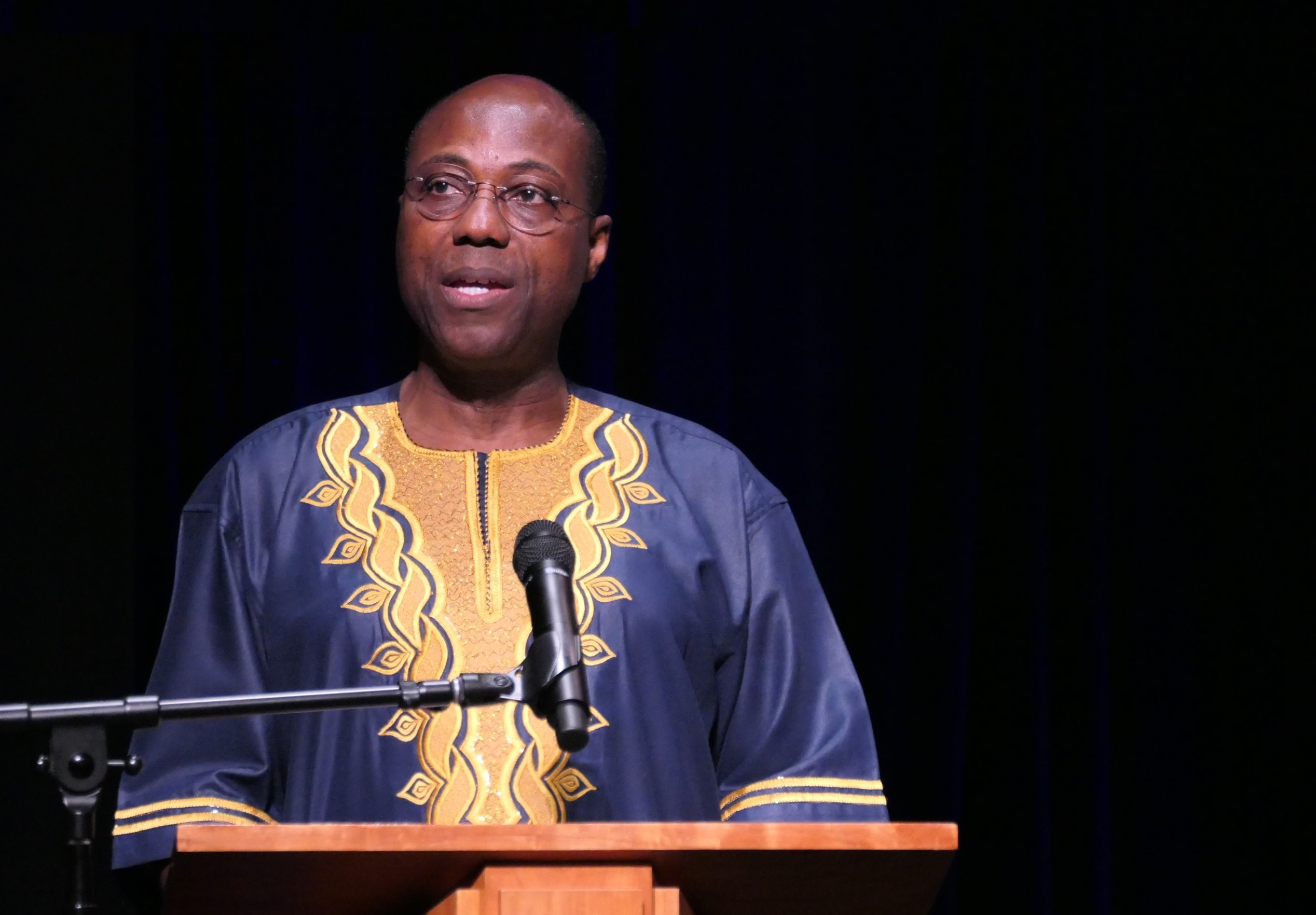(This article is part of One United Lancaster’s reporting on the 2023 Lancaster County Climate Summit.)
Millersville University “is proud to stand with you all … to advance climate awareness and take action locally,” the school’s president, Daniel Wubah, told his audience at Saturday’s Lancaster County Climate Summit.
Wubah’s speech at the Ware Center closed the daylong summit, which convened dozens of experts and advocates to discuss the climate crisis and local sustainability initiatives.
Higher education institutions like Millersville have a critical role to play, Wubah said, suggesting they can contribute in four ways:
- Do their part to minimize carbon emissions from campus facilities and maximize their climate resilience;
- Educate all students on climate issues;
- Foster innovation;
- Engage the broader community around climate awareness.
Millersville is doing all four, Wubah said. It has committed being carbon-neutral by 2040, and is moving toward that goal, overhauling its energy infrastructure, installing outdoor LED lights and so on.

The flagship exemplar of the university’s sustainability efforts is the Lombardo Welcome Center. The building is one of the five most efficient buildings in the country. Powered by solar panels, it generates a net energy surplus. The proceeds underwrite Millersville’s “Positive Energy Fund,” which supports student and faculty projects that advance global sustainable development goals.
Student education and academic innovation are complementary, overlapping goals. Millersville prioritizes experiential learning, Wubah said, noting the abundance of climate-related projects in the annual Made in Millersville conference and fair, held earlier in April.
The school’s Watershed Education Training Institute hosts classes in multiple fields and collaborates with local conservation groups and the state park system. Millersville faculty assisted Lancaster city in developing its greenhouse gas inventory and climate action plan.
As for engaging the broader community, the Ware Center’s role as a venue for the climate summit is a perfect example, Wubah said, as was last year’s summit at the Ware on the county’s Places 2040 comprehensive plan.
“I walk away today with a sense of optimism,” he said. While there are no easy solutions to the climate crisis, he described himself as “heartened” by the summit’s collaborative, can-do spirit.
Millersville is comitted to being the community’s climate action partner, he said, “in Lancaster County and beyond.”
Thaddeus Stevens College of Technology

Thaddeus Stevens College of Technology blends a commitment to the environment with its focus on social mobility and economic opportunity, President Pedro Rivera said.
Rivera spoke via livestreamed video during the Lancaster County Climate Summit on Saturday.
“We collectively take action to break down financial, economic and societal barriers,” he said, promoting “clear and sustainable pathways forward.”
He said the college wants to continue the legacy of its namesake founder, a noted abolitionist and activist.
Judd Pittman directs the college’s K-16 initiatives, which promotes STEM throughout students’ educational career. Stevens’ students, 39% of whom are eligible for Pell grants, receive an average of 20 job offers upon graduation.
Key points
- Pennsylvania’s legislature hasn’t comprehensively updated the Election Code since 1937. So the officials who run elections must rely on an amalgamation of sources outside of the text of the code itself, including recent legal opinions and advice from county solicitors, other administrators, and the state.
- Entire sections of the code are no longer in use, including directions on operating obsolete lever voting machines and language regulating the use of lanterns to light polling places.
- The legislature has not regularly incorporated new case law into the code, which leaves inaccurate vestiges. For instance, a rule limiting felons’ ability to vote remains on the books, despite being found unconstitutional.
- Newer election provisions and old code language conflict, causing confusion, lawsuits, and creating a patchwork of administration practices.
“They’re not putting out resumes,” he said.
Many graduates earn enough to buy a home within five years. They have skills they can trade on for life.
Stevens is striving to bring more women into the trades, aiming to boost its female enrollment, currently around 13%.
Pittman talked about the significant role of green occupations and green jobs that Thaddeus Stevens grads can pursue, such as wind turbine fabrication and ecosystem management.
“If you have that thirst, that value proposition of the work that you do feels really good,” he said. “You’re doing something that’s benefiting the planet.”
There is a lot of demand for people in the wastewater industry. Wastewater treatment is critical to preserving water quality, but is energy-intensive, complicating its environmental impact.
“It’s a pretty intense field,” Pittman said, and Stevens is looking to grow its program.
Another emerging field: The maintenance of electric vehicles. A challenge there is that companies such as Tesla will not release proprietary information to independent shops.
Pittman said Stevens is “always looking out further,” to be part of the dialog around climate action.
He expressed faith in young people: They are interested in climate work, and aware of the challenges that they face. As they come into the job market, he said, things are likely to improve quickly.
“We’re going to be in way better hands than we are today,” Pittman said.






